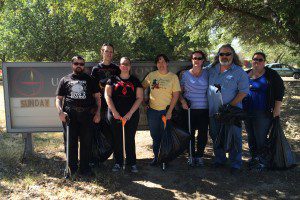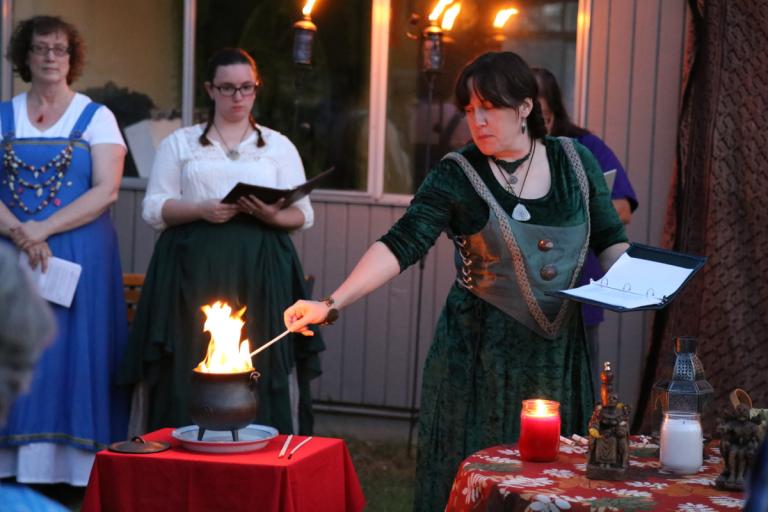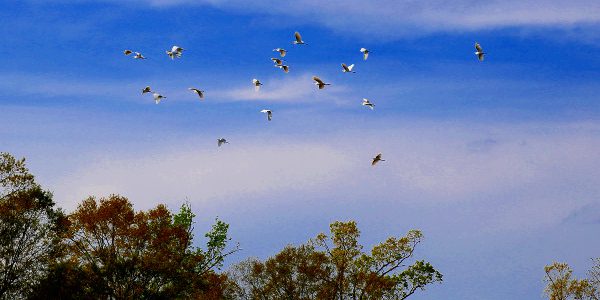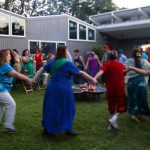So apparently I issued a challenge. Actually, the challenge came from Dver, who took my suggestion to write about our practices seriously and challenged polytheists to make “September a month of polytheists blogging about their actual practices.” This is a wonderful idea and I look forward to reading what other people are doing and what I can learn from them.
That means that this post, which was going to be a high-level look at the importance of relationships in contemporary Pagan and polytheist religions, instead needs to a be personal look at the relationships in my Pagan and polytheist religion. It also means I have to rearrange my outline. Because if we’re talking about my religious beliefs and practices, we have to start with Nature.
A relationship with Nature. When I was growing up, there were three kinds of religion. There was the fundamentalist Christianity preached at the small Baptist church my parents took me to. There was all other religion, which was judged by how close or how far (mainly how far) it was from that form of Christianity. And there was the intuitive spirituality I experienced when I went walking in the woods.
At the time, I didn’t have the context to understand that a very different form of religion was possible. I just knew the woods were a magical place where anything could happen and where there was always something new just over the next hill. The woods were a safe place. Of course there were rocks and thorns and occasionally deep water, and there were spiders and snakes – a few of which were poisonous – but those could be managed with a little caution. Despite its risks (or perhaps because of them) the woods were a retreat from the demands of home, school, and church.

I’m under no illusions about the harsh realities of Nature. But science teaches literally what Paganism expresses poetically: we came out of Nature and we are a part of Nature. My religion seeks to acknowledge that relationship in ritual and in ordinary actions – through walking outdoors, through saluting the sun and the moon each day, through sky-gazing and tree-hugging, and through picking up trash on the side of the road and other this-world actions to treat Nature like the Great Mother she is.
My religion is built on a relationship with Nature.
A relationship with the Gods. I’ve danced around the question of what the Gods are for years. Part of that is because the question is impossible to answer with any certainty, and part is because the best discourse on the nature of the Gods is done at an intellectual level far above a typical blog post. I’m a Druid and a priest, not a theologian. For this post, suffice it to say that there are Gods and that I and many others have experienced Their presence and Their activity.
Some religions teach that their God is so far beyond humanity that the only proper response is unquestioning submission (and if you think I’m only talking about Islam, you’d be wrong). The Gods are more than humans (older, stronger, wiser, and more) and therefore are worthy of our honor and worship, but They are not so far above us that we cannot enter into mutually beneficial and respectful relationships with Them. We can and I do.
My relationships with the Gods (or rather, with the handful of Gods who have made Themselves known to me) are founded on meditation (listening for and to Them) and prayer (speaking to Them). They’re founded on reciprocity – on making offerings to Them and on giving thanks for what They give me. They’re founded on mutual interests – telling Their stories, respecting and preserving the natural world, and working for sovereignty, just to name a few.
Here lately I’ve been reading and listening to some occultists and ceremonial magicians. Many of them treat the Gods as though they’re soulless forces to be invoked and manipulated as the magicians see fit. In fairness, this is not impiety so much as it’s a radically different notion of who and what the Gods actually are. If the Gods are offended, They can let the magicians know Themselves.
I don’t know about you, but I’m not looking for people in my life who I can order around. I want friends who speak their minds and don’t just repeat back what I want to hear. I want co-religionists who will challenge me to learn and grow. I want people who will remind me of what I promised to do, and in doing so help me to accomplish it. I want honest relationships, not business transactions.
It’s the same with the Gods. My religion is built on relationships with Them.
A relationship with each other. Humans are not solitary creatures. Like other primates, we live in communities. Our capacity for language has enabled us to communicate and cooperate at levels impossible for other species, which has led to us dominating the Earth. Whether that’s a good thing or a bad thing (or a little of both) is another question.
We form families based on relationships of blood and relationships of caring. We form neighborhoods based on relationships of place. We form businesses based on relationships of needs and the ability to fill them. And we form religions based on relationships of common beliefs, practices, values, and our ideas about the way the world works and how best to interact with it.
My religious relationships begin locally, with my UU church and CUUPS group. We don’t all believe the same things – even among the polytheists in our group. That doesn’t stop us from coming together to honor the Gods, to promote Their virtues and values, and to make the world a better place. I’m not a Heathen and I am actively avoiding a couple of Norse deities (“sorry, my dance card is already overbooked”), but I will happily take a part in our Gleichentag ritual to celebrate the Autumn Equinox and support my Heathen friends.

My religious relationships include people living far away who share my love of Nature and the Gods, especially my fellow Druids. They include Pagans and polytheists whose work I respect and whose counsel I value. We don’t all know each other well and if we tried to form an organization we might very well run into serious conflicts. But we have common interests and we can support each other, and so we do.
If there was a grove of mystical polytheist Druids nearby, that was networked into similar groups across the world, and that had already built the kind of institutions and infrastructure a religion needs, then perhaps I wouldn’t have to make compromises with my religious relationships. But there isn’t, and there won’t be one any time soon. So I’m happy to participate in my communities of convenience.
Lessons from a Greek sacrifice. Imagine, if you will, a holy day long ago in ancient Greece. There will be purification. There will a musical procession to an altar where a sacrificial fire is burning. Barley will be thrown. An animal, likely a bull, will be ritually killed. Some parts are offered to the Gods, some parts are retained by the priests, and most of the meat is cooked and eaten by the members of the community.
[This is an extremely high-level summary of one particular form of Greek sacrifice. For more details, read Homo Necans by Walter Burkert.]
There was a certain utilitarian quality to these sacrifices. There was no way to preserve meat and even a large family couldn’t eat a whole bull before it spoiled. Sharing it amongst the community just made sense. In coming together for a communal meal, the identity and unity of the group was reinforced – relationships were strengthened.
By offering to the Gods – by including Them in the ritual and in the meal – the relationship between the community and the divine was strengthened as well.
As anyone who has ever been in any kind of a romantic partnership will attest, relationships require work. Fail to do that work – providing for material needs, caring for each other “in sickness and in health,” talking and listening to each other on a regular basis – and the relationship will crumble.
The same is true of our religious relationships. I value Nature, so I spend time in Nature. I value the Gods, so I pray and meditate and make offerings and do Their work in this world. I value my co-religionists, so I talk with them and gather with them to honor our shared traditions and celebrate together.
My religion is a religion of relationships.

















